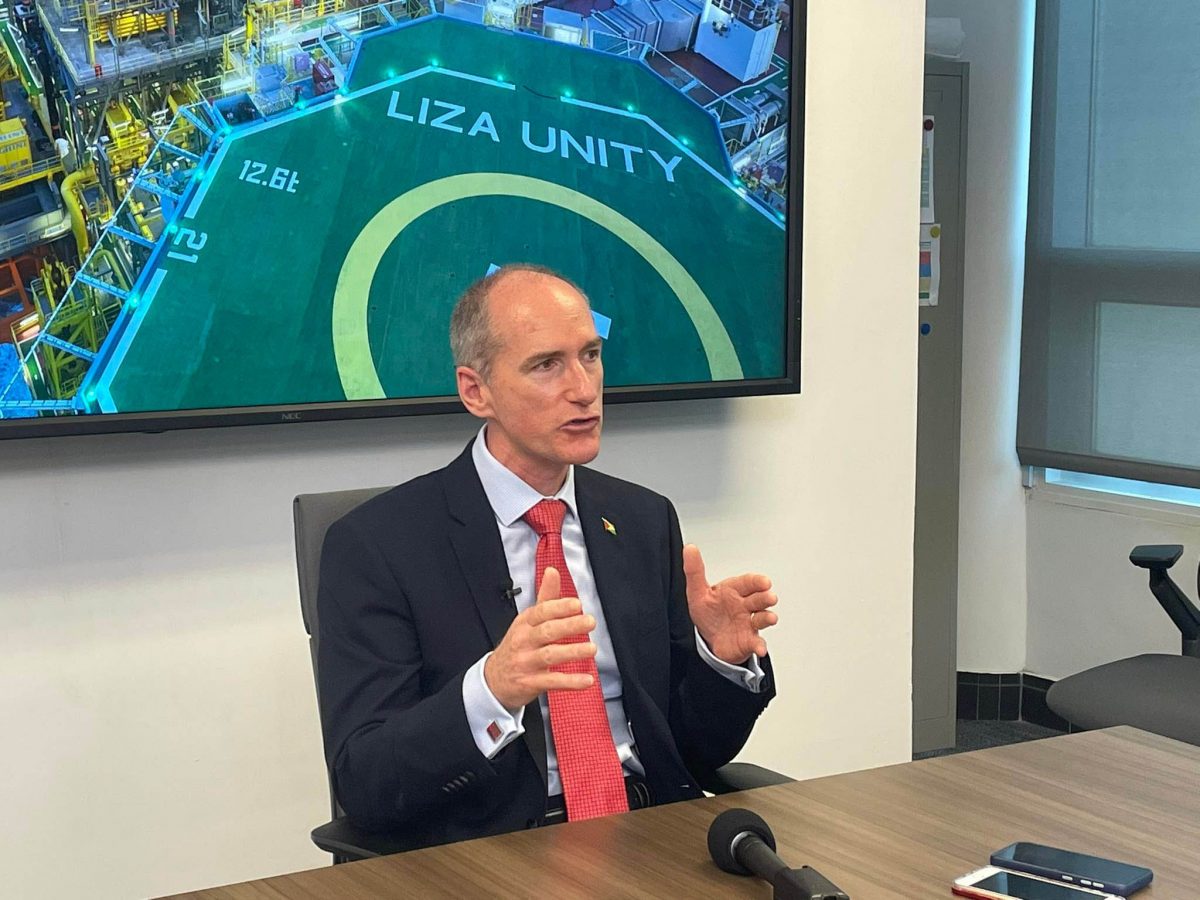With US$30 billion already invested in the production of oil and gas, President of ExxonMobil Guyana, Alistair Routledge, stated that it would be “very destructive” to investor confidence for Esso Exploration & Production Guyana Limited to renegotiate the 2016 Production Sharing Agreement (PSA).
Routledge made the comment during a press engagement yesterday after being asked by the Stabroek News if ExxonMobil is willing to renegotiate the 2016 PSA given the vast oil discoveries being made in the Stabroek Block.
“There is a wide public view that Exxon and its partners are benefiting from the 11 billion barrels of oil more than Guyanese. Will you be willing to renegotiate the 2016 PSA?” Routledge was asked.
As he responded, he was quick to point out that the view is unrealistic as the Guyanese people are benefiting more from the deal than the investors. He said it is very clear that under the Stabroek Block PSA, 50% of the profit goes to the country and 50% goes to investors. He noted that an additional 2% from the investors’ share goes towards the payment of royalty which results in Guyanese receiving a total of 52% of profit oil.
“In essence, 52% goes to the country so beyond that, what is incredibly important for any country or in any business is stability. We’ve made now over (US$)$30 billion worth of investment committed to the country based on the contract as it stands. To change the contract when you’ve already made that level of commitment would be very destructive to investor confidence in the Stabroek Block,” Routledge asserted.
He further noted that with 75% of revenues directed towards the repayment of costs, the remaining 25% is split 50/50 between the country and investors.
“Then out of the investor share 2% of the gross is paid (as royalty). So you’ll see through the course of any period, the Central Bank reports two things. One, the sales of the revenues are generated from oil lifts entitlements and then government takes their share of the profit oil and then in addition, we make payments directly to the NRF (Natural Resource Fund).”
Continuing to defend the controversial PSA which was struck without Guyana having expert advice, Routledge pointed out that it is always an investor’s risk his company takes when they enter a country to develop the resources.
“We take an investor risk and what those terms usually reflect is how much risk you are taking. And if you recall, when we signed the contract, we made one discovery Liza, nothing else. The system is truly still a frontier exploration base.”
In September last year, the PPP/C government took a firm stance on not renegotiating the 2016 Stabroek Block PSA.
“…The recent reports in the media present that the 2019 amendment to the PSA sets the precedent for the renegotiation of the entire contract between Guyana and ExxonMobil. The government reiterates that the contract will remain fiscally unchanged for the country and inves-tors’ benefits,” a statement from the Ministry of Natural Resources read. The statement was issued on the heels of criticisms from civil society advocate, Christopher Ram, who made public, the amendments to the 2016 PSA. He had said in his Stabroek News column, “The Road to First Oil”, that not only have both governments been silent, but that it dispels both governments’ reasoning that the contract cannot be changed.
“The government is of the view, as has been underscored by His Excellency Dr Mohamed Irfaan Ali and Vice President Dr Bharrat Jagdeo, that if specific fiscal considerations are amended in the current PSA, then that could impose unfavourable effects on current and future investments in Guyana, given the current world petroleum economy,” the statement issued from the Ministry back then said.
New acreage
Additionally, the company’s country president stated that they have signed up for the bidding round of the planned auction of available offshore oil blocks. He noted that they are in the process of assessing data available on the blocks up for bids.
“Well we’re always interested in your acreage clearly where we’ve had some success that brings a certain degree of interest and we should be knowledgeable of it. We’ve registered for the bigger end.”
Routledge went on to say that the information gathered from the data compounded with other terms of the new contracts will inform their decision whether to bid or not.
Last December, President Irfaan Ali had announced the launch of the licensing round for 14 offshore oil blocks.
April 14, 2023, has been set as the deadline for the close of submission for bids, and contracts are expected to be awarded by the end of May, 2023, following the evaluation of bids and negotiations.
The blocks being offered in what is the country’s first licensing round, are located in shallow and deepwater areas offshore, which are estimated to hold potential resources in excess of 25 billion barrels of oil equivalent (boe) and an estimated reserve in excess of 11 billion boe.
The minimum signature bonus requirement of US$10 million for shallow-water blocks and US$20 million for deepwater blocks were among new fiscal terms and conditions announced last month.
The total areas to be auctioned also have not been made public. On the availability of remaining blocks, Guyana Geology and Mines Commission (GGMC) commissioner, Newell Dennison, had in 2018, told this newspaper that from rough determinations, approximately 9,500 square kilometres are available within the coastal environment, 24,000 square kilometres within the environment of the continental shelf, 10,000 square kilometres within the deep water environment, and 9,000 square kilometres within the ultra-deep water environment. Most interest has been on the offshore area and particularly in the deep water environment following major discoveries there by ExxonMobil in 2015, putting the highly coveted Block C as the most sought after area.
This newspaper understands that Vice President Bharrat Jagdeo is spearheading the setting of both the terms of reference and overlooking the fiscal arrangement for a new model Production Sharing Agreement.






